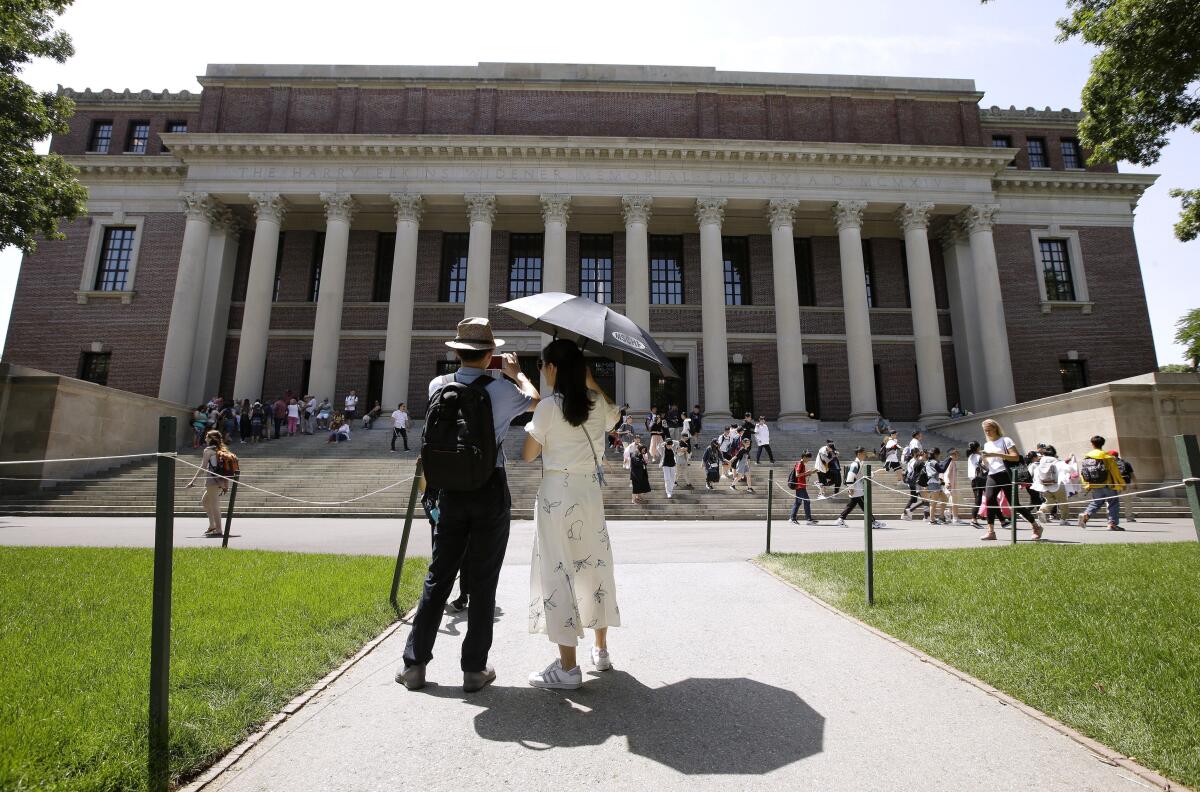Judge finds no discrimination against Asian Americans in Harvard admissions process

- Share via
BOSTON — Harvard University does not discriminate against Asian Americans in its admissions process, a federal judge ruled Tuesday in a lawsuit that reignited a national debate over affirmative action.
U.S. District Judge Allison D. Burroughs said in her decision that Harvard’s admissions process is “not perfect” but passes constitutional muster. She said there is “no evidence of any racial animus whatsoever” and no evidence that any admission decision was “negatively affected by Asian American identity.”
The group behind the suit, Students for Fair Admissions, says it will appeal the decision.
“Students for Fair Admissions is disappointed that the court has upheld Harvard’s discriminatory admissions policies,” Edward Blum, the group’s president, said in a statement. “We believe that the documents, emails, data analysis and depositions SFFA presented at trial compellingly revealed Harvard’s systematic discrimination against Asian-American applicants.”
Harvard did not immediately provide comment.
Both sides have been readying for a possible review by the Supreme Court, which last examined affirmative action in 2016 and upheld the practice at the University of Texas.
In the case at Harvard, the group argued that Asian Americans were held to a higher standard in admissions, amounting to an “Asian penalty,” while the school gave preference to black and Hispanic students with poorer grades.
Much of the suit centered on a subjective “personal rating” that Harvard assigns to applicants. The suit argued that Asian Americans consistently receive lower personal ratings because of racial bias, leading many to be rejected despite having strong academic records.
The group built its case around a statistical analysis using six years of Harvard admissions data. It found that Asian Americans had the lowest personal ratings and the lowest admission rates, while black and Hispanic fared far better in both areas.
Harvard countered with its own analysis finding no evidence of bias. During the trial, the dean of admissions offered possible reasons to explain the low personal rating for Asian Americans, saying they may come with weaker letters of recommendation than other students.
Both sides clashed over of a 2013 internal report at Harvard examining race in admissions. It found that if the school weighed applicants based on academics alone, 43% of the admitted class would be Asian American, while in reality, it was 19%.
Students for Fair Admissions said the report was proof Harvard knew about racial inequality but did nothing to correct it. Harvard said the report was only meant to be “exploratory” and was based on incomplete data.
Like many elite colleges, Harvard acknowledges it considers race in admissions but says it’s only one of many factors.
The trial offered a rare glimpse into Harvard’s secretive admissions process, including the ways it favors wealth and privilege. In a series of emails released in the case, some Harvard officials openly discussed the fundraising prospects of applicants.
In one email chain, a fundraising official advised the dean of admissions on an applicant whose family previously had given $8.7 million. Despite that generosity, the official said, the family wasn’t likely to give “further major gifts.”
The judge’s decision provides at least temporary relief for other colleges that consider race and have been watching the case closely. Many elite schools consider race as a way to boost diversity, although the practice is banned in some states.
Harvard has called Students for Fair Admission a political group with no real interest in helping Asian Americans. Blum, the group’s leader, is a legal strategist who has orchestrated lawsuits to ban affirmative action at other colleges.
During the trial, no students testified that faced discrimination by Harvard. The group says it has more than 20,000 members, including one Asian American who was unfairly rejected in 2014, but none have come forward publicly.
Along with Blum, the group’s leaders include Abigail Fisher, who sued the University of Texas in a case that went to the Supreme Court in 2016. Fisher said she was rejected because she’s white, but the court issued a 4-3 decision upholding the school’s use of race.
Previous Supreme Court decisions have allowed colleges to consider race as long as it’s “narrowly tailored” to promote diversity. Racial quotas have been ruled unconstitutional, but the court has permitted policies that use race as a “plus factor.”
The Trump administration has fought affirmative action at several schools. In August 2018, the Justice Department issued a statement siding with Students for Fair Admissions, accusing Harvard of “outright racial balancing.” It’s also investigating the use of race at Yale University.
Students for Fair Admissions has also sued the University of North Carolina, Chapel Hill, over alleged discrimination against Asian American applicants. That suit, also filed in 2014, is still ongoing.
More to Read
Sign up for Essential California
The most important California stories and recommendations in your inbox every morning.
You may occasionally receive promotional content from the Los Angeles Times.










